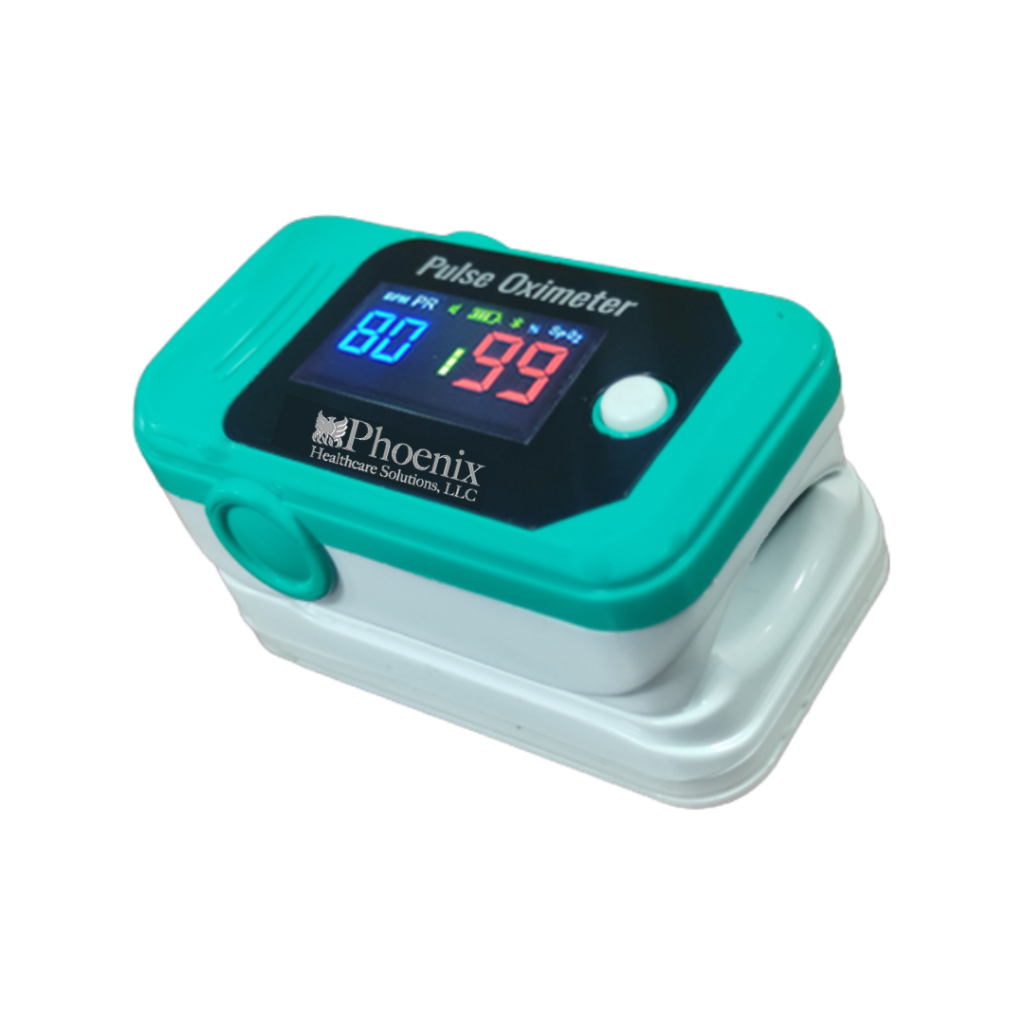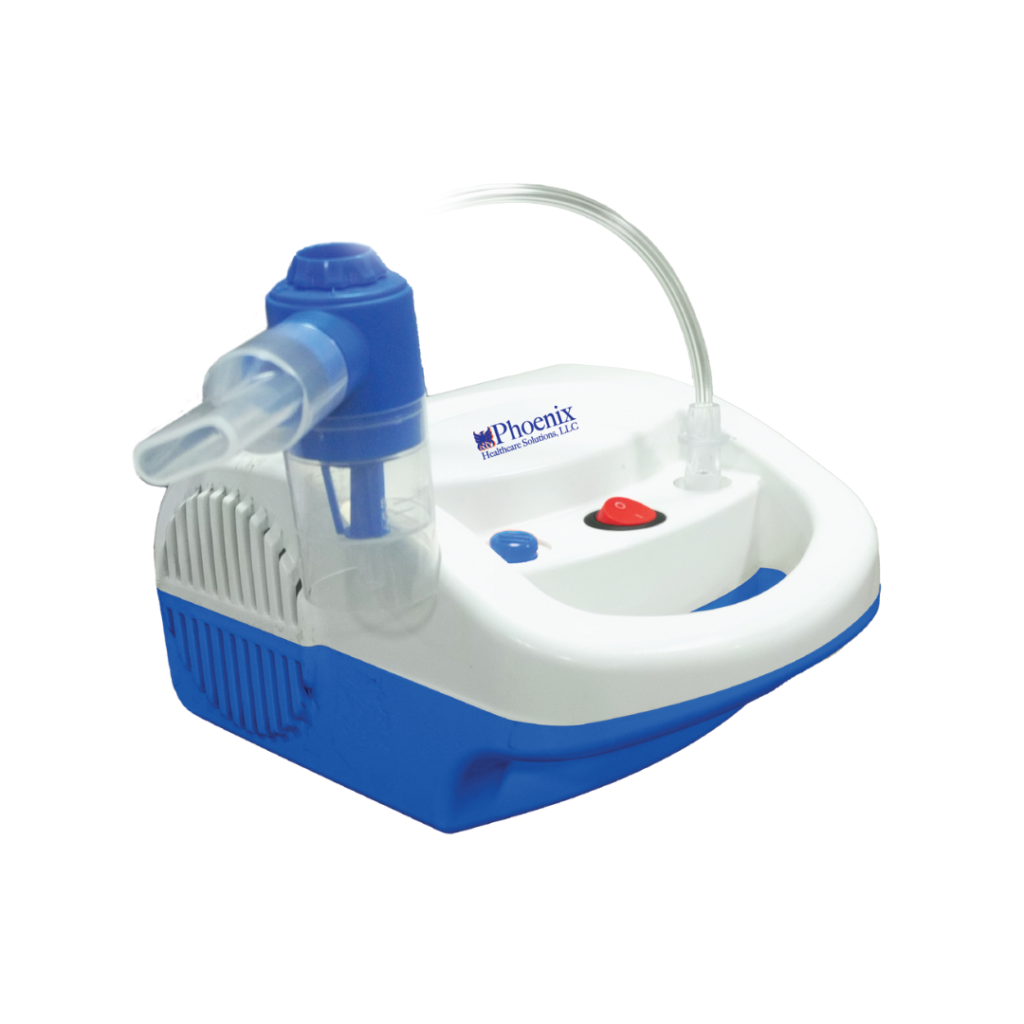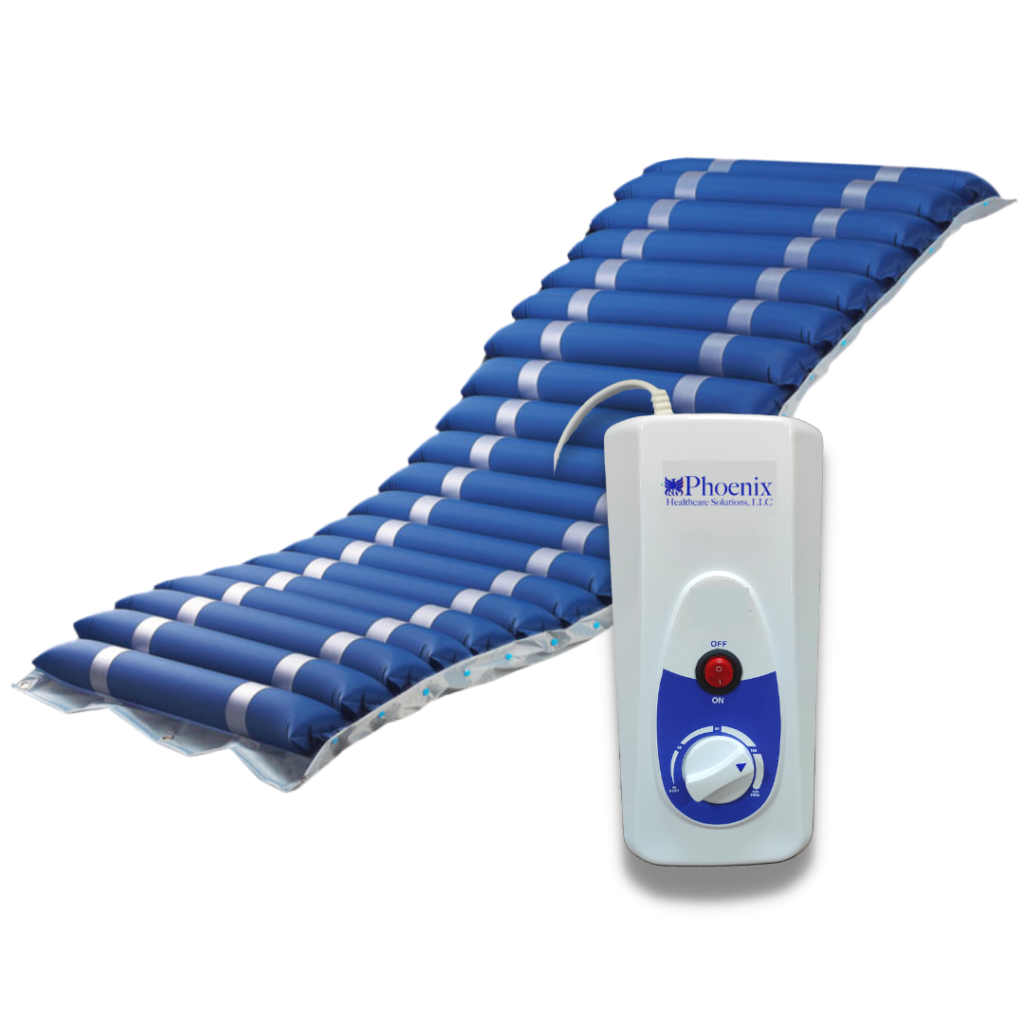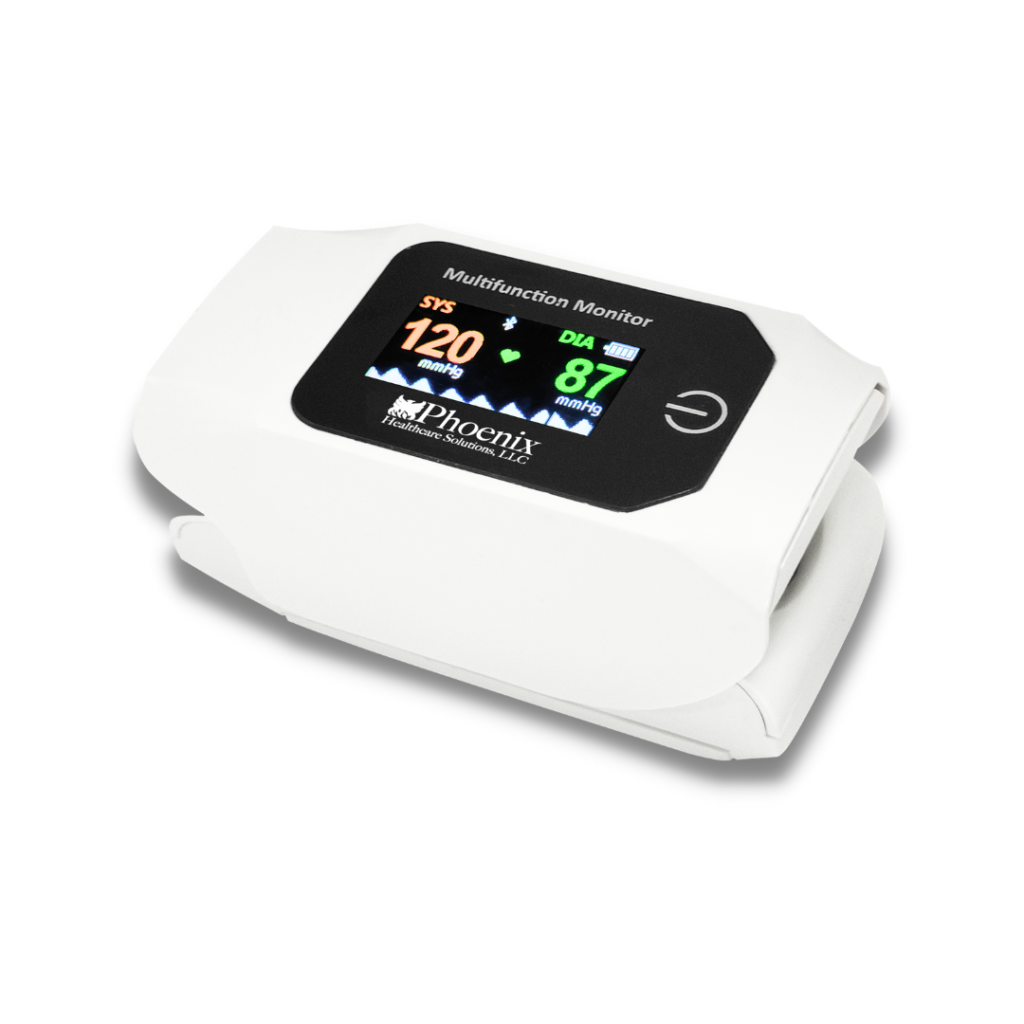
Pulse Oximeter with Bluetooth
Phoenix Pulse oximeter with Bluetooth is a non-invasive, reliable device that provides results quickly, monitor oxygen saturation (SpO2) and pulse rate easily and precisely in a clinical and home environment.
- Small and compact device with an anti-slip body, auto-off function, and one-button operation
- Built-in clip with medical-grade soft silicone cushion for better finger/toe grip
- Lightweight, sturdy, low power consumption, and portable medical device
- Works on a smartphone with Bluetooth connection, with a history option for old data tracking
- Readable large OLED display with multi-colour and multiple display modes
- Display shows SpO2, PR, SpO2 bar graph, battery, Bluetooth, sound, with low battery, error indicator
- Easy to use, clean, disinfect, and store to enhance personal care and helps maintain a healthy lifestyle
- Monitor the oxygen saturation level for early diagnosis or to track your treatment for Covid-19, chest pain, chronic respiratory or cardiovascular disease, sickle cell crisis, neonatal, hypotensive (SBP < 80 mmHg), trouble breathing, viral or bacterial infections, pregnancy
- To evaluate the blood oxygen and pulse rate of patients during obstructive sleep apnea, deep sleep, surgical procedures that require sedation, under anaesthesia, or on the ventilator
- Use full to detect low oxygen levels and irregular or abnormal pulse rate in premature birth, low birth weight, and cardiovascular conditions in infants and children
- Encourage to keep a record of oxygen saturation in blood for health management with proper diet, medication, and exercise
- Pulse oxi to keep a check on physical exertion, emotional fluctuations, overweight, medications, smoke inhalation, intake of drugs, multisystem trauma, and stress
- Oxygen monitor to determine whether someone needs supplemental oxygen therapy or oxygen supply to help breath
- At home, work, hospital, gym, covid centres, and other medical places
- Convenient to have while camping or traveling by train, bus, air, or car to maintain healthcare
- Suitable for all age groups and best for elderly people
- Download and install the app “HomeAid” on your smartphone to launch the application
- Turn on the smartphone’s Bluetooth if not already on then on the Fingertip pulse oximeter press the on/off button
- The application will search for oximeters nearby, then select the HomeAid name displayed on the screen
- Add the device by clicking on “bind” to pair your smartphone and pulse oximeter
- Before taking measurements rest for at least 5 minutes
- Rest your hand on your chest at the heart level and hold it still
- Then place the finger into the silicon cushion, deep inside and in the correct position
- The part of the sensor should be at the back side of the patient’s hand and now press the on/off button
- You will hear a continuous beep-beep sound indicating that the test has started. Wait for a moment and the SpO2 and PR values will be displayed on the screen after the bar graph starts flashing
- Oximeter reading takes time to get steady so keep the monitoring device in place for at least a minute or longer if the reading is not stable
- You can note down the data displayed on the OLED screen or the app if required or can retrieve it from the history of the application
- Oximeter will automatically shut down after showing a value for about 10 seconds
- The oximeter will automatically turn off if not operated
- Brand Name: Phoenix Pulse Oximeter with Bluetooth
- Model Number: PHX-PO-01
- Application: Non-Invasive Monitor to measure Oxygen Saturation Level and Pulse Rate from The Tip of The Finger
- Classification: Class II
- Warranty: 12 months
- Certification: ISO 9001, ISO 13485
- Technology: Pulse Oximetry and Bluetooth Technology
- Material: Plastic (ABS), SS, Silicon, Electronics Components
- Colour: White and Blue (customized)
- Dimension: H 34 x L 58 x W 30 mm
- Display Mode: OLED (H 17 x L 22 mm)
- Weight: 50 g (with batteries)
- Bluetooth: Connection Medium
- Automatic Off Time: After 10 second
- Display: Multi Colour and Multiple Modes
- SpO2:
- Measurement Range: 35-100%
- Accuracy: +2% (80%-100%): +3% (70%-79%)
- Pulse Rate:
- Measurement Range: 25-250 bpm
- Accuracy: ±2 bpm
- Operating Conditions:
- Working/Operating Temperature Range: 5°C to 40°C
- Storage Temperature Range: -10°C to 50°C
- Power Supply Mode: 1.5 v, 2 Batteries (Removable/Replaceable AAA Alkaline Batteries)
- Accessories: 1 Pulse Oximeter, 1 Bag, 2 AAA Batteries, 1 Instruction Manual
- OEM/ODM/Private Label: Available with Personalized Logo
FEATURES
- Small and compact device with an anti-slip body, auto-off function, and one-button operation
- Built-in clip with medical-grade soft silicone cushion for better finger/toe grip
- Lightweight, sturdy, low power consumption, and portable medical device
- Works on a smartphone with Bluetooth connection, with a history option for old data tracking
- Readable large OLED display with multi-colour and multiple display modes
- Display shows SpO2, PR, SpO2 bar graph, battery, Bluetooth, sound, with low battery, error indicator
BENEFITS
- Easy to use, clean, disinfect, and store to enhance personal care and helps maintain a healthy lifestyle
- Monitor the oxygen saturation level for early diagnosis or to track your treatment for Covid-19, chest pain, chronic respiratory or cardiovascular disease, sickle cell crisis, neonatal, hypotensive (SBP < 80 mmHg), trouble breathing, viral or bacterial infections, pregnancy
- To evaluate the blood oxygen and pulse rate of patients during obstructive sleep apnea, deep sleep, surgical procedures that require sedation, under anaesthesia, or on the ventilator
- Use full to detect low oxygen levels and irregular or abnormal pulse rate in premature birth, low birth weight, and cardiovascular conditions in infants and children
- Encourage to keep a record of oxygen saturation in blood for health management with proper diet, medication, and exercise
USES
- Pulse oxi to keep a check on physical exertion, emotional fluctuations, overweight, medications, smoke inhalation, intake of drugs, multisystem trauma, and stress
- Oxygen monitor to determine whether someone needs supplemental oxygen therapy or oxygen supply to help breath
- At home, work, hospital, gym, covid centres, and other medical places
- Convenient to have while camping or traveling by train, bus, air, or car to maintain healthcare
- Suitable for all age groups and best for elderly people
HOW TO USE
- Download and install the app “HomeAid” on your smartphone to launch the application
- Turn on the smartphone’s Bluetooth if not already on then on the Fingertip pulse oximeter press the on/off button
- The application will search for oximeters nearby, then select the HomeAid name displayed on the screen
- Add the device by clicking on “bind” to pair your smartphone and pulse oximeter
- Before taking measurements rest for at least 5 minutes
- Rest your hand on your chest at the heart level and hold it still
- Then place the finger into the silicon cushion, deep inside and in the correct position
- The part of the sensor should be at the back side of the patient’s hand and now press the on/off button
- You will hear a continuous beep-beep sound indicating that the test has started. Wait for a moment and the SpO2 and PR values will be displayed on the screen after the bar graph starts flashing
- Oximeter reading takes time to get steady so keep the monitoring device in place for at least a minute or longer if the reading is not stable
- You can note down the data displayed on the OLED screen or the app if required or can retrieve it from the history of the application
- Oximeter will automatically shut down after showing a value for about 10 seconds
- The oximeter will automatically turn off if not operated
SPECIFICATIONS
- Brand Name: Phoenix Pulse Oximeter with Bluetooth
- Model Number: PHX-PO-01
- Application: Non-Invasive Monitor to measure Oxygen Saturation Level and Pulse Rate from The Tip of The Finger
- Classification: Class II
- Warranty: 12 months
- Certification: ISO 9001, ISO 13485
- Technology: Pulse Oximetry and Bluetooth Technology
- Material: Plastic (ABS), SS, Silicon, Electronics Components
- Colour: White and Blue (customized)
- Dimension: H 34 x L 58 x W 30 mm
- Display Mode: OLED (H 17 x L 22 mm)
- Weight: 50 g (with batteries)
- Bluetooth: Connection Medium
- Automatic Off Time: After 10 second
- Display: Multi Colour and Multiple Modes
- SpO2:
- Measurement Range: 35-100%
- Accuracy: +2% (80%-100%): +3% (70%-79%)
- Pulse Rate:
- Measurement Range: 25-250 bpm
- Accuracy: ±2 bpm
- Operating Conditions:
- Working/Operating Temperature Range: 5°C to 40°C
- Storage Temperature Range: -10°C to 50°C
- Power Supply Mode: 1.5 v, 2 Batteries (Removable/Replaceable AAA Alkaline Batteries)
- Accessories: 1 Pulse Oximeter, 1 Bag, 2 AAA Batteries, 1 Instruction Manual
- OEM/ODM/Private Label: Available with Personalized Logo









Explore
Products





